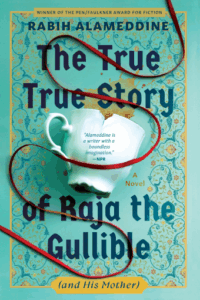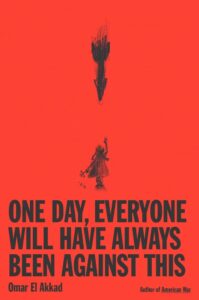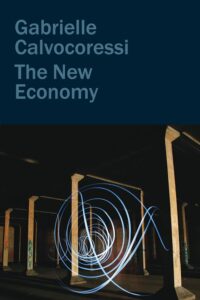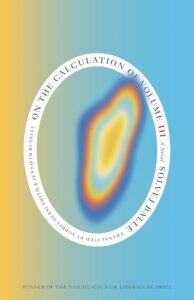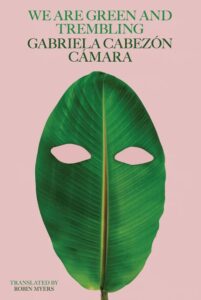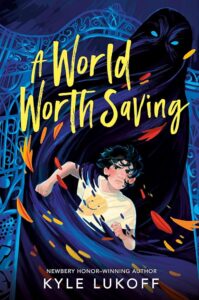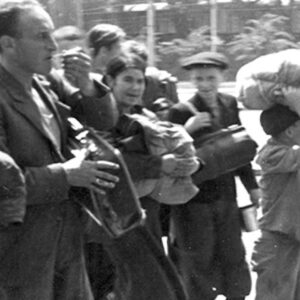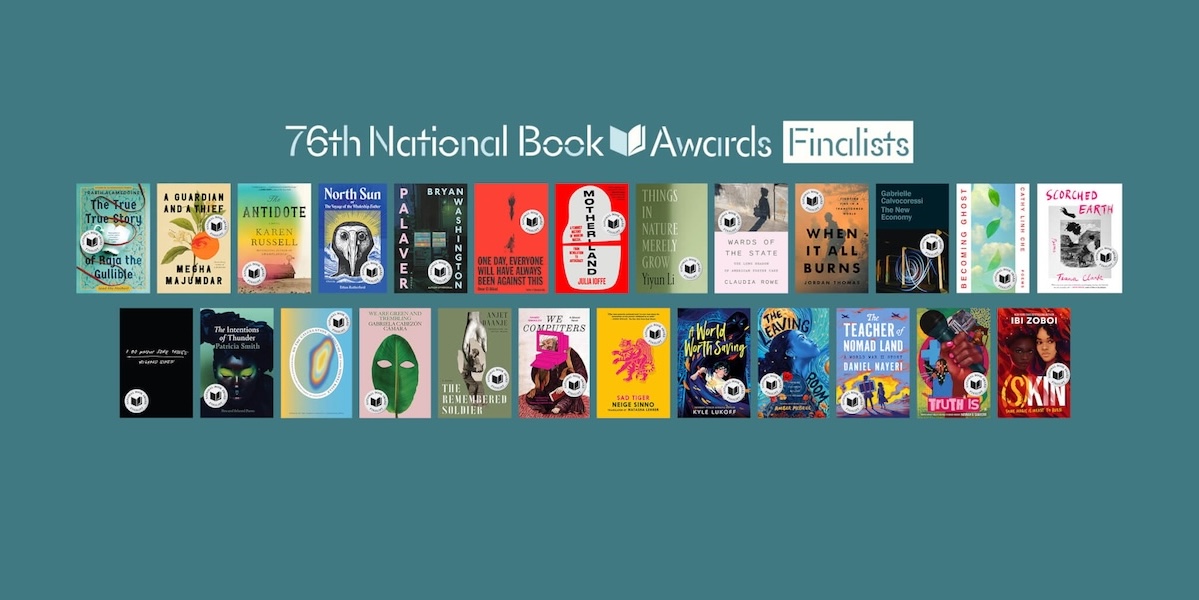
Meet the 2025 National Book Award Finalists
Quick Questions for the Year’s Best Writers, Poets, and Translators
The winners of the 76th National Book Awards—given every year in Young People’s Literature, Translation, Poetry, Nonfiction, and Fiction—will be announced next week in a ceremony hosted by Jeff Hiller at Cipriani Wall Street in New York City.
Ahead of the festivities, Literary Hub caught up with the finalists to ask them a bit about their books, their reading habits, and their writing lives.
Fiction
Rabih Alameddine, author of The True True Story of Raja the Gullible (and His Mother)
Who do you most wish would read your book? (Your boss, your childhood bully, etc.)
Fuck childhood bullies!
The one I most wish to read my novel is a close friend who has been unable to read books ever since her husband committed suicide. She can’t concentrate. She had always been a voracious reader. That came to a halt. I love her dearly, and I feel that if she’s able to read my last novel, it would mean that she’s on the road to feeling herself again.
What was the first book you fell in love with?
I have many answers to that one depending on what we mean by “book.” The first literary novel I fell in love with was Naipaul’s amazing A House for Mr. Biswas at sixteen. But the first novel was Harold Robbins’s The Carpetbaggers at thirteen (best novel for masturbating while pretending to read “a great story, really” ever!).
But my first love was earlier, when I was four, maybe five. I was with my father at the airport’s waiting room before boarding a flight from Kuwait City to Beirut. At the kiosk, I saw my first clothbound collection of Superman comics in Arabic. I was a voracious reader of comics then, probably more looking at them than reading. I remember the salesman telling me the price was three whole dinars. I ran to my father asking if he could buy the volume for me. He suggested that was too much money. I asked him how much money he made. I remember him being so surprised. I asked if he made $1,000 dinars a month, which was the biggest number I could even conceive of. I remember him telling me he did while beginning to smile. And I struck him with my coup de grace. I asked him if he made $1,000 dinars, couldn’t he spare just three dinars for me. He broke out laughing, handed me three dinars, and I received my treasure, which I treasured for years until one day during the civil war, some militia broke into our house in Lebanon while we were away. I hope some other kid loved it as much as I.
Which book(s) do you reread?
I’m a reader who loves rereading just as much or more than reading. I have reread almost every book I loved. The first time, I read for the pleasure of discovering something new. The second time, to see what I’ve missed (the more I love the book, the more likely I missed quite a bit because I was so taken by the story). The third time is when I reread to try to understand how a book comes together. Sometimes, if I haven’t read a book in ten years, I will reread it because I would’ve forgotten everything in it!
Let’s make a list of the books I have read more than three times. I’m putting up a long list, in no particular order, hoping to entice some of you to pick up some of my favorite books.
Vladimir Nabokov, Pale Fire
Vladimir Nabokov, Lolita
Antonio Muñoz Molina, Sepharad
Olga Tokarczuk, Flights
Italo Calvino, If on a Winter’s Night a Traveler
Fernando Pessoa, The Book of Disquiet
Aleksandar Hemon, The Lazarus Project
Patrick White, The Twyborn Affair
Marguerite Duras, The Lovers
Marguerite Yourcenar, Memoirs of Hadrian
W.G. Sebald, The Emigrants
Leo Tolstoy, Anna Karenina
Claudio Magris, Microcosms
Zoe Wicomb, David’s Story
Imre Kertész, Fatelessness
Javier Mariás, Tomorrow in the Battle Think on Me
Salman Rushdie, Midnight’s Children
V.S. Naipaul, A House for Mr. Biswas
V.S. Naipaul, A Bend in the River
James Joyce, Dubliners
J.M. Coetzee, Waiting for the Barbarians
Zbigniew Herbert, Mr. Cogito
I’m sure I’ve forgotten some, and then others, like Toni Morrison’s Beloved or Faulkner’s The Sound and the Fury, I’m not exactly sure how many times I’ve read—at least twice, maybe more, but I know that I haven’t in a long while.
If you weren’t a writer, what would you do instead? What is your favorite way to procrastinate when you are meant to be writing?
I’d be a lazy bum, obviously. I’m just a lazy bum who happens to write. I was born to lazy bum. I’ve set up my life to lazy bum as much as I can. Lazy bumming is my superpower. I can spend hours surfing the internet for no discernible reason. I watch Arsenal games religiously and spend at least one hour a day reading soccer news. Hell, I can watch soccer games from the Malaysian league, the Iraqi league, whatever game is on television or online. I can binge-watch bad television shows without remembering anything from them. I can spend a day reading the best books or the worst books, but don’t make me get off my butt. The only thing that would get me to move is having to get a quart of ice cream (I have been known to ride my bike to the store if I’m out of ice cream).
I’ve gotten to the stage of lazy bumming that before I agree to go on a date or have sex, I first decide whether this man is worth jumping in the shower for. I have a shower-worthy rating system. Tom Hardy, for example, is a 5/5, which means that if Tom wanted to have sex with me, I’d quickly jump in the shower. (Yoo-hoo, Tom, if you’re reading this, hit me up.)
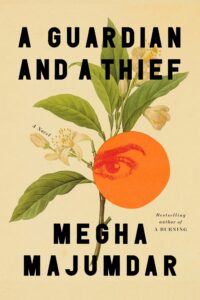
Megha Majumdar, author of A Guardian and a Thief
What time of day do you work (and why)?
Morning! The full, clean day ahead of you, that feeling of unlimited time and possibility.
How do you tackle writer’s block?
If writer’s block is an expression of fear—fear of failing on the page—part of the solution is to accept that failure is part of the path, and each failure is temporary if we keep moving forward.
What was the first book you fell in love with (and why)?
An early book I loved was a collection of the Brothers Grimm’s fairy tales, an introduction to the allure of story and different ways of thinking through morals.
What book has elicited the most intense emotional reaction from you (made you laugh, cry, be angry)?
Can I share an essay which made me laugh? Laura Preston’s “An Age of Hyperabundance,” first published in n+1 and recently included in The Best American Essays edited by Jia Tolentino. It’s an essay about visiting an AI conference and encountering mediocrity. It’s intellectually serious yet very, very funny.
If you weren’t a writer, what would you do instead?
Neurosurgery.
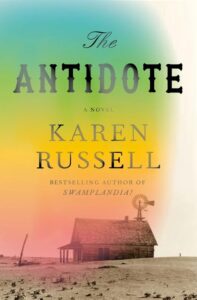
Karen Russell, author of The Antidote
How do you tackle writer’s block?
Ordinarily I find it much easier to commit to several hours of writing than a fixed word count. But a few months back, I participated in Jami Attenberg’s 1000 Words of Summer and had a wonderful time. There was something so liberating about pushing myself to write 1000 words a day for two weeks, knowing many others were doing the same thing. I also recently read and deeply loved Ramona Ausubel’s forthcoming Unstuck: 101 Doorways Leading From the Blank Page to the Last Page, which is a beautiful garden of forking paths and a great practical aid to anyone feeling blocked or lost.
But I also confess that for the past year, I haven’t been writing consistently. I’ve been sort of water-beetle skimming across the surface of various story-drafts, waiting to sink into something. As unmoored as I always feel when I’m between books, at this point in my career I can honestly share (and even believe for myself) that a fallowing season can be a time of regeneration. A quieter period, where one is reading and thinking and dreaming and listening but maybe writing very little themselves, perhaps mostly scribbling, taking notes, collecting fragments—that’s also part of a writing cycle, at least in my experience.
While I was researching my last novel, I became obsessed with soil. Healthy, biodiverse, living soil becomes lifeless dirt when it is ceaselessly put “into production,” tilled to powder. So if you’re in a quiet stretch right now, writing nothing or very little, perhaps you don’t have a block you need to tackle. Maybe you’re fallowing.
What’s the best or worst writing advice you’ve ever received?
I think the often-repeated “write what you know” can be excellent advice and also damaging advice, depending on how a writer interprets it. As a younger person, I think I took this as a kind of rebuke, or a warning not to overstep the bounds of one’s own life. I heard a scolding note in it that I think can sometimes clip the wings of younger writers. It’s bad advice, I think, if a writer interprets it to mean, “Don’t travel too far beyond the bounds of your own biography. Don’t go to places in your fiction for which you have no direct, exact experiential referent.”
Of course I now see that I was always writing what I knew, even when I was writing about the daughters of werewolves. When people interpret “Write what you know” to mean, “write an honest fiction, make your imaginary gardens with real toads in them, build your stories out of the truths that you’ve experienced here on earth,” then I think it’s great advice. Fiction is an alchemical art, a way of knowing not only the worlds that exist today but hypothetical worlds, vanished pasts and imaginary futures. Why read or write fiction at all, if you don’t want to go beyond the mind you have?
Who is the person, or what is the place or practice that had the most significant impact on your literary education?
This will be just one of a thousand possible and equally true answers I could give to this great question, but a few things came to mind right away. One is the public library where our mother frequently took us as kids. In my memory, it is terrestrial heaven. There was a freezing cold central room, such a contrast to the Miami humidity, and it felt to me like a sort of intergalactic bus terminal. From there you could go anywhere—the English moors, to Mars, to Macondo. I really can’t overstate how much the extreme air-conditioning played into my experience of the public library as a magical place, how much I loved the card catalogue and my library card, the physicality of the books. Now I take my six-year old and my eight-year old to the library and get to watch them browsing the stacks, auditioning books, thumbing through the illustrations and sounding out the little sticks that stack into meaning, into a storyteller’s voice nested deeply inside them, going beyond the minds they have as they learn to read. The library, I can’t imagine my childhood without it. So many of the writers I love were fledged in libraries. It’s where I found the books that gave me, as Maureen McClane writes, “deep seas in which to dream and make a self.”
What book has elicited the most intense emotional reaction from you (made you laugh, cry, be angry)?
Omar El Akaad’s One Day, Everyone Will Have Always Been Against This.
If you weren’t a writer, what would you do instead?
If I wasn’t a writer, I fear I would have spontaneously combusted a long time ago. So I would be a fire, hopefully doing something useful, melting s’mores for children, keeping someone’s feet warm.
I teach literature and creative writing, and I love teaching. I love being with my kids more than I know how to express. And in another life, I would have been a full-time librarian.
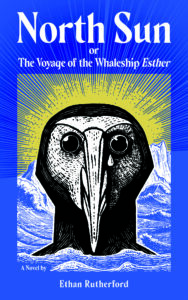
Ethan Rutherford, author of North Sun: Or, the Voyage of the Whaleship Esther
What time of day do you work (and why)?
My writing routine is all over the place until something clicks; and then I try to stay in that groove (physical location / time of day) for as long as possible. For North Sun, I found I worked best very early in the morning, when the house was asleep and I was needed for nothing at all. I made coffee and stumbled up to the attic in the dark. I have good memories of working on this book in this way. Sometimes I would just listen to music until the sun came up and that also felt like writing.
How do you tackle writer’s block?
Read, read, read; watch movies; listen to music; play with the dogs. I’ve learned the hard way that I can’t force my way through fallow periods (when I’ve tried, the results are not good–entropic, unsettled, despairing, no sense of play). So when a “block” happens I’ve come to understand it’s best for everyone if I just welcome it as a gathering phase. And you can always practice being more open and receptive to whatever is zinging by. Do things you love, find art that moves you, something ambitious, eccentric, simple, imperfect, and soon enough you’ll realize the world has returned you to the station of your old obsessions; suddenly, through the static, you can hear them again.
What’s the best or worst writing advice you’ve ever received?
Trust the reader. Your job as a writer isn’t to reproduce, but suggest, the world. This came from reading Robert Boswell.
Which book(s) do you reread?
The books I revisit most are the ones that seem like regular books until you turn a page and think: this has produced an emotional response that is way beyond my control. A few: Train Dreams by Denis Johnson; A High Wind in Jamaica by Richard Hughes; The Collected Works of Billy the Kid by Michael Ondaatje; I Remember by Joe Brainard. Joan Didion (almost all). More recently, Loved and Missed by Susie Boyt.
How do you decide what to read next?
I’m blessed with friends who make great suggestions (ahem, Caroline, Paul) and I walk into bookstores and talk to booksellers or read the shelf-talkers or just linger long enough for something I’ve never heard of to make its way into the pile. If I’m doing research it’s a different story, more directed, rigid, “of use”, with one book suggesting another, but also quite fun.
What do you always want to talk about in interviews but never get to?
Cooking. And video stores, but I understand why no one wants to talk about them.
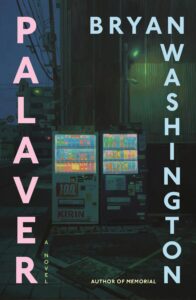
Bryan Washington, author of Palaver
Which non-literary piece of culture—film, tv show, painting, song—could you not imagine your life without?
Edward Yang’s Yi Yi.
Which book(s) do you reread?
Another Brooklyn (Jacqueline Woodson), Kitchen (Banana Yoshimoto, translated by Megan Backus), A Whore Diary (Akira the Hustler), Beijing Comrades (Bei Tong, translated by Scott E. Meyers), Life on Mars (Tracy K. Smith), Ways of Going Home (Alejandro Zambra, translated by Megan McDowell), Almond (Won Pyung-Sohn, translated by Sandy Joosun Lee), Love in the Big City (Sang Young Park, translated by Anton Hur).
How do you decide what to read next?
Translators and booksellers.
What do you always want to talk about in interviews but never get to?
At the moment, I’ve been shooting film with a Fujifilm Zoom Date 90S. But for digital, I’ve been keen on my Sony ZV-E1 (it’s marketed as a vlog camera but I like the stills too).
If you weren’t a writer, what would you do instead?
Gay sauna manager.
*
Nonfiction
Omar El Akkad, author of One Day, Everyone Will Have Always Been Against This
What time of day do you work (and why)?
Left to my own devices, I’ll sleep in till close to noon, take a long shower or go on a walk to try to clear my head, and then write into the early evening. Then I’ll edit late at night into the early morning. But none of this is compatible with an even halfway healthy personal or professional life, so I tend to just work whenever I have time; I’ve gotten a lot less precious about it.
How do you tackle writer’s block?
I try to read as far outside the styles and genres I work in as possible. Most of the time, that means poetry, where I’m able to enjoy a kind of distillation of what I find most beautiful about the craft, without worrying about trying to meet that same standard, because poetry is so beyond my limited talent, it doesn’t really prompt much insecurity. Other times I’ll read old interviews with my favorite writers, in part to remind myself that none of this new. Plenty of people far more skilled than I’ll ever be have fallen into the same pit, and managed to climb out.
What’s the best or worst writing advice you’ve ever received?
One of my first editors at the newspaper I used to work at told me I should write every story as though I was also writing the next day’s follow-up at the same time. For years, it was the best piece of journalism advice I ever received. But I also think there’s something powerful about the ways it can be applied to fiction, to how any story is told.
Who is the person, or what is the place or practice that had the most significant impact on your literary education?
When I was in college, I got accepted into a creative writing course taught by the poet Carolyn Smart. She was the first working writer I’d ever met—I think until that point, I’d sort of thought of the names on the covers of books as existing in some faraway, abstract place. Carolyn was the first person who made me consider the possibility that, no, this was real work done by real people, that one could make a go of writing. She changed the course of my life.
Which non-literary piece of culture—film, tv show, painting, song—could you not imagine your life without?
Around the age of 12 or 13, I stumbled onto the album Dog Man Star by Suede. It’s about an hour straight of every conceivable flavor of melodrama imaginable—which, when you’re careening into adolescence and everything is the biggest thing, becomes a dangerously re-enforcing soundtrack for the emotionally insufferable. I must have listened to that record every other day for the better part of two years. To this day, I can’t go back to it: it’s too welded to that very formative part of my life.
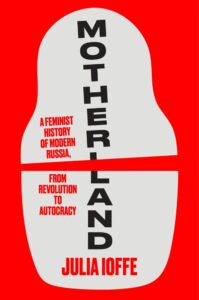
Julia Ioffe, author of Motherland: A Feminist History of Modern Russia, from Revolution to Autocracy
Who do you most wish would read this book? (your boss, your childhood bully, etc.)
I wish every day that my maternal grandmother Emma could read Motherland. She was such a central part of it, from the seed of the idea—she was a cardiologist and one of the “exceptional” foremothers I had been urged to write about—to its execution. She helped me research the book. She went with me to the archives of the NKVD in Odessa to find her father’s case file and then petitioned the archives in Moscow to show her her uncle’s file. She sat with me for hours of interviews and, sensing her time was up, went through her own personal archive and labeled the back of every picture of every aunt, uncle, cousin, classmate. She read the first drafts of this book and told me they were boring and unoriginal. She encouraged me to keep going. She died of Covid in December 2020, and for a long time, I didn’t know how I could possibly finish this book, which was so much about her, without her. I dedicated the book to her, but it is a paltry stand-in. I wish I had finished it in time for her to read Motherland and to see how people have responded to the book. She would have been so proud and excited.
How do you tackle writer’s block?
I try to keep writing through it, even if it only yields 5 words at the end of the day. Sometimes, just the act of banging your head on the blank page, of starting, failing, deleting, restarting, helps you figure out where the writing needs to go. Sometimes, it makes you realize that you just don’t have what you need yet, that you need to read or research more—which can easily turn into procrastination. The other thing I try to do when I’m writing—always, really, but especially when I’m in the thick of writing—is to have something beautiful to read before bed, something to allow my mind to decompress and sleep, while bathing it in the kind of writing I wish I could execute. Which is why I read only fiction for pleasure: it’s where the really good writing is.
What’s the best or worst writing advice you’ve ever received?
The best bit of writing advice I’ve ever received was from George Packer. I was working as a fact-checker and I had scraped up enough vacation time to go on a self-funded reporting trip to Moscow for the first time. He told me, “Write about what you find interesting. If it’s interesting to you, then it will be interesting to others.” He was right.
What part of your writing routine do you think would surprise your readers?
I wrote the bulk of this book when I was still single and childless, so I was able to slip into what I call “vampire mode”: Write until 7 am, sleep till 5pm, write till 7 am, and so on, for a month. It was a crazy way to write—and live—but I loved the absolute quiet and absolute focus of the nighttime hours. Everything felt much more distilled and intense, more pure and clear. And I was productive. The first time I did that, I wrote about 70,000 words in month—and much of it was usable! I also felt like I got an inkling of what solitary confinement does to people, so I’d have to stop and get back to normal life for a couple weeks before doing that again. Now that I have a partner and a child, I don’t know how I’ll be able to do this again…
If you weren’t a writer, what would you do instead?
A doctor. I didn’t give up on the idea (and plan) that I would follow my foremothers into medicine and, for a long time, I was convinced that that could be the way into writing: after all, some of my favorite Russian writers, like Mikhail Bulgakov and Anton Chekhov, were doctors. I scrapped the plan when it became clear that that path was closed because I was firmly on another one, but medicine is still the thing that interests me most, outside of history/politics/etc. The way the human body works—and all the ways it can fail to—fascinates me endlessly.
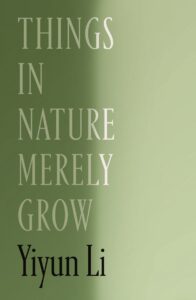
Yiyun Li, author of Things in Nature Merely Grow
Who do you most wish would read this book? (your boss, your childhood bully, etc.)
Readers who understand that thinking can be a deep and passionate way of feeling, too.
What’s the best or worst writing advice you’ve ever received?
Some twenty years ago, I was enrolled in Iowa’s Writers’ Workshop. Jim Crace, a fabulous writer, was visiting the program and read a draft of my story. He told me that there were a hundred things in writing and ninety-nine of them I either already knew or could figure out by myself, so he would teach me the one thing nobody had taught me yet, which was to look up every word that I would use in the dictionary. That piece of advice ranks as one of the top gifts I’ve received in my life.
Which book(s) do you reread?
I spend more time rereading than reading new books. The latter takes up a quarter of my reading and while doing it, I am also expanding my rereading list, which can be long: War and Peace, Moby-Dick, Shakespeare, many of D.H. Lawrence’s novels, Thomas Hardy, William Trevor, Elizabeth Bowen, Mavis Gallant, Anne Carson—the list goes on.
What is your favorite way to procrastinate when you are meant to be working?
Reading poetry. Sooner or later a phrase or a line will send me to my own work.
If you weren’t a writer, what would you do instead?
I would have loved to be a musician, though for sure that’s wishful thinking, as I have just enough talent in music to know that I can only be a hobbyist.
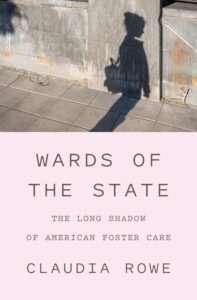
Claudia Rowe, author of Wards of the State: The Long Shadow of American Foster Care
Who do you most wish would read this book? (your boss, your childhood bully, etc.)
Anyone who looks at “difficult” kids and views them as inscrutable, unreachable, or irredeemable. Anyone who appreciates a good story found in unexpected places.
How do you tackle writer’s block?
That’s just another name for fear. Fear of starting. Fear of the page. Fear of facing my limitations. When that happens, I need a running start. I’ll read a craft book or the work of other writers I admire, anything that gets me charged up. Then I’m off and running.
Who is the person, or what is the place or practice that had the most significant impact on your literary education?
The essayist Ted Hoagland was a teacher of mine in college. He had a severe stammer, which made it difficult for him to speak, so every word he uttered was chosen with great precision. He could be both devastatingly blunt and shockingly generous. And his artistry in describing real life made a deep impression on me.
Which book(s) do you reread?
As I kid, I used to reread compulsively, I think to relive the feeling of being inside a story. Now, if I reread it’s usually to unravel some mystery of structure or style. The last book I reread that satisfied both aims was Trust Exercise, by Susan Choi.
What do you always want to talk about in interviews but never get to?
The ways that nonfiction can be art.
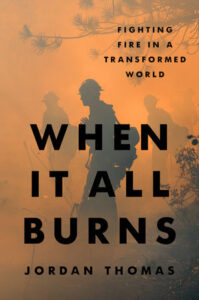
Jordan Thomas, author of When It All Burns: Fighting Fire in a Transformed World
What time of day do you work (and why)?
I write early in the morning when my mind feels clear, but I try to organize the rest of my day around creating space for that mental clarity. So, when I’m in an intense period of writing I consider everything I do to be a part of the work.
How do you tackle writer’s block?
I’m skeptical of the idea of writer’s block. I think writing is simply an incredibly challenging endeavor. If this challenge is writer’s block I can’t say I’ve ever tackled it. Recently I’ve been trying to make the challenge more fun and tactile by sketching ideas on a chalkboard, moving to pen and paper, and finishing on my laptop.
What book has elicited the most intense emotional reaction from you (made you laugh, cry, be angry)?
Migrations by Charlotte McConaghy made me cry.
What part of your writing routine do you think would surprise your readers?
After I wrap up my writing, I’ll often go on a trail run with a notebook in hand. Something about the movement allows the words from the day to settle and the next ideas to occasionally wash over me, in which case I’ll stop running and scribble furiously on the side of the trail to try to catch the words before they slip away.
What’s the best or worst writing advice you’ve ever received?
Write drunk, edit sober.
*
Poetry
Gabrielle Calvocoressi, author of The New Economy
Who do you most wish would read this book? (your boss, your childhood bully, etc.)
Wow, I love the notion of my childhood bully(s) reading this book that’s so much about kindness and keeping on. I suppose I like the idea of any bully reading this. It’s sort of a book that’s about the fact that no bully can really truly win. But also, I just love the idea of anyone reading the book. Of it being a portal that leads me to new neighbors and friends. Maybe we’d all meet and have supper and talk about our bullies. Exorcise them. Laugh and eat and just heal together.
What time of day do you work (and why)?
Somehow I’ve become an afternoon writer after a whole life of early mornings. But I do spend lots of the morning daydreaming (ideally) and reading. So I guess the work starts then. I also work an academic job and so there’s lots of work attached to that. I have learned I need to be flexible and write and dream and read when there’s time. Oh who am I kidding, I dream all day long. But writing I often happens in the afternoon or in between times.
How do you tackle writer’s block?
I am someone who goes years without writing. Sometimes that feels okay and even generative. Sometimes I need to do something about it. For this new book, The New Economy, I had gone years without writing. For Lent in 2023 I initially gave up chocolate but then I decided the hardest thing to give up would be self-loathing. And as I pondered how to do that my inside voice said, “Write a poem a day for Lent. No matter what. No judgment. Just make the time. And then don’t look at those poems for a year.” It was a great practice. It reminded me it’s fine (for me) not to write but only (for me) until it starts being about the denigration of the self. And then it’s time to force the bloom.
What’s the best or worst writing advice you’ve ever received?
Richard Howard walked into my class at Columbia and said, “Saying you are a famous poet is like saying you are a famous mushroom.” I’ve remembered that every day of my life since then.
Who is the person, or what is the place or practice that had the most significant impact on your literary education?
No one has been more of a presence in my life as a poet as Mark Doty. My first teacher who saw the light in me from the beginning. Who has always kept checking in. Who looks out for me even when I don’t know he is. I love him. He has saved my life because he’s valued it so much.
In terms of other practices, during a nervous breakdown in 2004 I did Jon Kabat Zinn’s Mindfulness and Stress Reduction course. That practice of sitting and being mindful has stayed with me. At first I was SO MAD when my teacher would say, “How I am feeling right now is how I am feeling right now.” But now I say it to myself many many times a day.
What part of your writing routine do you think would surprise your readers?
Sitting and staring at a wall for 5-7 hours is absolute bliss for me and makes poems happen.
Which non-literary piece of culture—film, tv show, painting, song—could you not imagine your life without?
I watch a lot of television. A lot. It has helped me ever since I was a little kid watching Guiding Light after school. If I am writing a book I am watching The Vampire Diaries. Which I recommend highly for anyone writing a book.
What was the first book you fell in love with (and why)?
The Outsiders just spoke to me. I wanted friendships like that, I wanted to look like that, I wanted the rural place I grew up to feel that safe because of friendships amidst the danger.
Which book(s) do you reread?
I reread lots of books of poems I reread May Sarton’s journals most years. I reread the All Souls series (vampires again) by Deborah Harkness a lot. I reread Great Expectations a lot.
What is your favorite way to procrastinate when you are meant to be working?
I will go eat dumplings and drink green tea instead of doing pretty much anything. I love reading instead of working. I love making things not feel like work.
What book has elicited the most intense emotional reaction from you (made you laugh, cry, be angry)?
I just read Nova Scotia House by Charlie Porter. I think it’s the best book I’ve read in years. I can’t even put words to how deeply moved I am by it. How inspired.
How do you decide what to read next?
I have an enormous pile of books with me always. It’s always instinct. I’m often reading a bunch of stuff at once.
What do you always want to talk about in interviews but never get to?
I have begun shooting baskets and I kind of want to talk about it all the time but there’s never a proper way to get into it.
If you weren’t a writer, what would you do instead?
Hm. I am on volunteer crew at Bluestem Conservation Cemetery. I think I’d do something with green burial and pastoral work. That feels like poems and also meaningful in really hands on ways that I am drawn to.
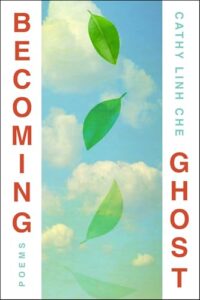
Cathy Linh Che, author of Becoming Ghost
How do you tackle writer’s block?
I read! I walk. I play games with the page.
What’s the best or worst writing advice you’ve ever received?
Matthew Rohrer told me, and I’m paraphrasing, If you write a poem that day, and it’s ‘not good,’ just write four more that day. That was helpful because I was being very precious about my work, and his advice opened up the possibility to feel like I always have more to say or explore.
Which non-literary piece of culture—film, tv show, painting, song—could you not imagine your life without?
These genres (music, theatre, film, tv, and even painting) all feel like poetry to me, and I don’t think I could live without any of them. I’ll add political organizing to this list.
What is your favorite way to procrastinate when you are meant to be working?
I don’t really call it procrastinating because we have bodies and bodies need to be fed, but when I should be working, sometimes, I’ll just get up and start cooking. I love the feel of my hands making something nourishing and life-giving.
What do you always want to talk about in interviews but never get to?
I talk about this quite a bit, but would love to always talk about the liberatory and revolutionary possibilities of poetry. I was listening to an interview today about how we define our politics is related to how we define our art practices and how we define our spirituality (or might I say, how to grow our souls). I think that none of these things are separate, that they are all part of the same field. Poetry is an action, and poetry can and should inspire action, action, I hope, toward love, truth, and togetherness. Yuri Kochiyama said, “We are all part of one another.” She was a political activist, but how can I not see the poetry in what she is saying?
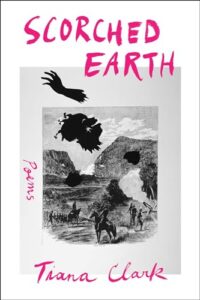
Tiana Clark, author of Scorched Earth
Who is the person, or what is the place or practice that had the most significant impact on your literary education?
My high school creative writing teacher, Bill Brown, is (without a doubt) the person who has made the most significant impact on my literary life and education. He was the first person to ever read a poem aloud to me, which is how he started each class (“…to get langauge in the air” he said) for the two years I was his student—a tradition that I now replicate in each class or workshop that I teach in honor of him, my Mr. Brown.
He introduced me to my favorite poets like Sharon Olds and Rita Dove at fifteen-years-old, which not only altered each cell in my hormone-drenched body, but opened up a mighty portal of possibilities for what a poem could access and ignite inside of me and my burgeoning relationship to the page. Most of all, he gave me the time, space, and permission to write and explore my explosive teenage emotions and dark Daria-esque energy (this cartoon reference is for my Oregon Trail/elder millennials peeps). After I graduated high school, we remained friends and exchanged poems for over twenty years until he passed away a couple of years ago.
What part of your writing routine do you think would surprise your readers?
I don’t write every day. I read every day, but I don’t do daily word counts or time block my writing time (unless I have a big deadline). I’ve tried, but it’s just not how my neuro-spicy brain works, especially with new and nebulous content. I take notes all the time, but I often have intense hyperfocus sessions a few times a week where I download the deluge that’s been accruing inside my body, mind, and the never-ending sea of tabs on my web browser. I may not write every day, but when I do write I hunker the hell down and ride the electric current of what I am trying to process, reckon with, or think through until I exhaust and distill the initial spark of an idea.
This means I could be writing all day, losing complete track of time and space, completely engrossed inside the essay or poem. I’ve tried to change and be more regimented, but I just ended up feeling like a frustrated failure. Instead of trying to constantly change and optimize myself to be more efficient or productive, I’m learning to accept and celebrate who I am as I lean into my own unique writing rhythms. We all approach the blank page differently. I hunt for a long time then feast—and repeat.
Which non-literary piece of culture—film, tv show, painting, song—could you not imagine your life without?
I grew up as an only child to a single mother who often worked several jobs to support our small family, which meant I was home alone a lot. I could not imagine growing up without a television, which I always had on to make the house feel full of other voices besides my own. Each night, I would try and fall asleep to Star Trek: The Next Generation with the futuristic symphony of high-tech and intergalactic noises, but I couldn’t really slip into deep sleep until I heard the safety of my mother’s keys jingling at the door.
What is your favorite way to procrastinate when you are meant to be working?
Ugh, I have a stupid game that I play on my phone sometimes (that I am kind of addicted to at the moment). One of my friends pinpointed the specific kind of joy and consistent dopamine spritz that these kinds of games provide by making you “complete small manageable tasks.” I definitely notice my uptick in playing when I am really stressed out, anxious, or overwhelmed with deadlines, to-dos, or flying during a government shutdown. Something about planting corn and sugarcane soothes me combined with a streak of low stake wins from a match-3 game, phew! What a tiny, insignificant thrill! I delete and download the game all the time, ha.
If you weren’t a writer, what would you do instead?
A quirky meteorologist or a storm chaser with something to prove.
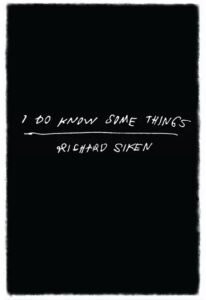
Richard Siken, author of I Do Know Some Things
Who do you most wish would read this book? (your boss, your childhood bully, etc.)
This book is about my stroke and my recovery. A common experience stroke survivors wrestle with is the confusion and surprise of being abandoned by loved ones. My best friend, of 20 years, dumped me. He didn’t say why. Maybe he was afraid that I’d be a burden. Maybe he was afraid that I’d be different. I wish he’d read the book but I’m sure he won’t.
How do you tackle writer’s block?
Sometimes you want to say something important but you just can’t. Usually it’s because you need to write something stupid. It’s sitting in the front of the queue, blocking everything. You have to write it. Even if you know it will come to nothing—a bad story, a bad idea—you still have to get it out of you before you can move on.
What’s the best or worst writing advice you’ve ever received?
The best advice I’ve gotten is “Don’t get precious with it. Stay curious and keep moving.”
What part of your writing routine do you think would surprise your readers?
I often use dictation software. The most interesting work happens when I’ve just woken or I’m falling asleep. It all slips past my internal censor.
Which non-literary piece of culture—film, tv show, painting, song—could you not imagine your life without?
Anything/everything by Philip Glass. Let’s say Liquid Days (Part 1). Or Laurie Anderson’s “Let X = X”
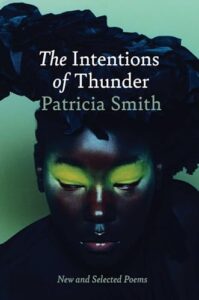
Patricia Smith, author of The Intentions of Thunder: New and Selected Poems
Who do you most wish would read this book? (your boss, your childhood bully, etc.)
More than anyone, I wish my father could read this book. He was my first love, my most strident supporter from the first time I picked up a crayon and sounded out something to scrawl. He was my first storyteller, a “griot of the back porch,” whose tale-spinning prowess traveled to Chicago with him from the Arkansas backwoods. His greatest goal in life was to open up the world for me, and I’d love for him to know not only that he succeeded, but just what I found inside.
How do you tackle writer’s block?
No such thing. Nada. When I feel like I’ve written myself into a wall, or into a corner, or up a tree, whatever they say nowadays, the rest remedy is to switch genres. I always, always, always have a children’s story on the back burner. Kids lit—especially a wacky language-driven picture book—is a playful type of writing, gleefully sans the usual rules, and diving into it siphons stress. Or I switch to a chapter of my novel or an essay. Or I play an impossible game with a poem (a sonnet with no “e”s, by example, or a love poem that manages to avoid all 500+ words on my list of words that should never be in love poems). The key is to keep writing, but to surprise and challenge yourself by switching gears and remembering what stressless writing feels like.
What’s the best or worst writing advice you’ve ever received?
My best and worst writing advice was one-in-the-same. Once upon a time, in another life far, far away, my whole world—well, imploded. A well-meaning colleague actually said “So what are you going to do now that you can’t write anymore?” At the time, it was the most tone-deaf, demoralizing sentence I’d ever heard, the last thing a writer would ever want to hear. But then it turned into an impetus, a launch pad, an incentive unlike any other. Everything I’ve done since basically answers, You’re kidding, right?
Who is the person, or what is the place or practice that had the most significant impact on your literary education?
The person, my father. Gwendolyn Brooks was a mighty powerful presence, but my father came first. The institution? The long-running, contentious, controversial, incendiary, debate-sparking, points-are-not-the-points, inevitably harmless competition known as the poetry slam. What a wild ride! Years of waxing poetic from various rickety stages taught me every meaning of “audience,” trained me to listen, led me to respect the poet in everyone, nudged me toward experimentation in narrative and performance, gave me a grounding of sound and spirit instead of textbook and rules. My father sparked my love for language, but the slam is where my love for poetry, and all its limitless possibilities, began. I also learned to how to poem above the whir of a cappuccino machine, and how to perform a poem called “Skinhead” to a room populated by actual skinheads.
Which non-literary piece of culture—film, tv show, painting, song—could you not imagine your life without?
SONG. Most poems are just songs that are sitting still for a moment. I can unequivocally say that I wouldn’t be where I am if it wasn’t for Smokey Robinson, who Bob Dylan has called “America’s greatest living poet.” Those wistful quatrains and sharp internal rhymes, tangled with that ceaseless longing and creamy high tenor, were my first lesson in prosody. I grew up addicted to all types of music—Sinatra, house, Brook Benton, disco, Chicago blues, Streisand, James Taylor. And I’m a bit of a miracle—if you pull any “oldies” station, I guarantee that I can flawlessly croon at least 80% of the songs. Including Neil Diamond. Music is just poetry hitting a different air.
What do you always want to talk about in interviews but never get to?
My weird little novel that big important writing people have warned me against because, they say, I’m writing it the wrong way—defiantly first person, deviant structure, a way-delayed gotcha and what will surely be categorized as the oddest final chapter in literature. I love dancing to their alarm bells. I’ll tweak a line from the Luther Ingram hit: “If writing you is wrong, I don’t wanna be right.”
*
Translated Literature
Solvej Balle, author of On the Calculation of Volume (Book III)
Who do you most wish would read this book? (your boss, your childhood bully, etc.)
My main character. I wouldn’t mind hearing her honest opinion.
What time of day do you work (and why)?
When I start at five in the morning it feels as if the day is untouched and everything is open. I can’t always do that, but it is great when it works.
How do you tackle writer’s block?
I used to say that I never have writer’s block—I just have long periods where I don’t write. As if putting words on paper is all that matters. The not-putting-words-on-paper part is much more important. But recently, I’ve started feeling guilty when I don’t put words on paper. I worry about not delivering what’s expected of me. I guess that is writer’s block—not writing and feeling bad about it. But there’s something wrong. It feels like being told to go see the doctor and be cured for not having a runny nose.
I don’t know how to tackle that type of writer’s block, actually. It’s unexplored territory. I’ll tell you if I find a solution.
Who is the person, or what is the place or practice that had the most significant impact on your literary education?
Of course, you can’t point out the most important ones—parents and their outlook on life, teachers, friends, lovers, etc. They all have an impact on the choices you make and the roads you take.
But when it comes to the feeling that writing books is, in fact, something some people do, living in Shakespeare and Company in Paris for quite a long time did have a significant impact. Sleeping among the books, reading, and working in the bookstore with people who were often writing—or dreaming about writing—constantly handling books that someone had written—it made it so obvious that writing books is something that some people do. I think it took some of the impossibility away: books are written, and sometimes people actually do it. Maybe there was an element of bringing it all down to earth.
What part of your writing routine do you think would surprise your readers?
The inconsistency and lack of routines. I do have a preferred routine: sometimes I start very early in the morning and work all day—and go to bed and wake up the next day. But not all the time—at other times my routine is a mess. I just see what happens. Sometimes I don’t get anything done.
Which non-literary piece of culture—film, tv show, painting, song—could you not imagine your life without?
Maybe some paintings by Brueghel, some music by Bach—but one shouldn’t think too much about it. There are so many things one wouldn’t like to live without; it feels like a loss even thinking about it.
What was the first book you fell in love with (and why)?
A Danish children’s book called The Blue-Eyed Pussy in English, which I first encountered in kindergarten—it’s about a cat with blue eyes who is constantly told by the yellow-eyed cats that it isn’t a real cat—but in the end they have to admit that a cat with a different eye colour can still be a real cat. A moral tale in seven chapters with a lot of repetition. I still know it by heart. It said “novel” on the front—I remember asking my mother what a novel was, but I don’t remember her answer.
After having listened to it in my kindergarten, my dad bought me another book by the same author, but it just wasn’t the one I wanted—so I started to cry when I got it. I think it was the first time (maybe the only time) I’d been dissatisfied with a gift. So it must have been very important to me. My parents got me the right book soon after. I think they understood how important books can be.
Which book(s) do you reread?
The Odyssey, Plato’s Republic, Aristotle’s Poetics, Lucretius’ On the Nature of Things. They are the ones I have been going back to most often—lots of others I would love to reread but haven’t: The Tale of Genji, Elsa Morante: History, Simone de Beauvoir: All Humans Are Mortal—but I never get there. I hesitate. Maybe I am afraid.
Some books are like houses: you can visit them, leave them, and come back. Other reading experiences are more like travelling: you have been on this journey before, but if you get on board once again, you don’t know where it will take you. Maybe one should not try to repeat it.
What is your favorite way to procrastinate when you are meant to be working?
Favorite but not most frequent: going into the garden, drifting from one small task to another. Clearing up a bit, having a cup of coffee in the greenhouse. But I don’t do it often enough. My most frequent way of procrastinating is just getting stuck on the internet like most other people. Sometimes it leads to interesting questions or fruitful doubt—more often it’s a waste of time. Maybe I should decide never to go on the internet without putting my wellies on; then it would be easier to choose a more fruitful type of procrastination. Luckily, I didn’t know the word procrastination when I was younger. I don’t think I would have written anything if I’d been made to feel wrong about losing focus and letting my mind wander.
If you weren’t a writer, what would you do instead?
I might be a bookseller. My first proper job was in the local bookstore, and since then I occasionally return to the idea. There was a wonderful etched glass window with Pegasus riding across the sky at the back of the store—nobody would ever see it apart from us working there. I’ve always thought of bookstores as containing bits of hidden magic in the middle of selling pens, paper, and cookbooks.
Also, I sometimes think I could have been a gardener like my grandfather and several family members, but I lack structure and wouldn’t be able to get things done or align my work with the seasons. I would do things too early or too late. So it has to be bookselling—probably still out of touch with time, though.
Sophia Hersi Smith and Jennifer Russell, translators of On the Calculation of Volume (Book III)
Who do you most wish would read this book? (your boss, your childhood bully, etc.)
SHS & JR: Someone falling in love. Someone at a loss. Someone traveling by train. Someone content in their loneliness. Someone who fears succumbing to apathy. Someone caught between two places. Someone in awe of the beauty around them. Someone lonely in the company of others. Someone falling out of love. Someone belonging to more than one place. Someone who would like to listen a little more closely.
What time of day do you work (and why)?
SHS & JR: We do our best work on self-imposed translation retreats, preferably somewhere isolated. We work early morning till late evening, ideally with breaks for swimming in a lake or sea. Swimming is great for translation.
How do you tackle writer’s (or translator’s!) block?
SHS & JR: Read out loud. Collect good words like magpies. Find a horizon and not a screen to stare into. Frequent and elaborate snacks. More swimming.
What’s the best or worst translating advice you’ve ever received?
SHS & JR: The best: To “felicitate!”
If you weren’t a translator, what would you do instead?
SHS: I’m not sure, maybe I’d be a bookseller. I think Jennifer would be a gardener.
JR: A crossword puzzle maker! Otherwise, anything less sedentary and hunched. A gardener maybe, if gardeners didn’t also have to work in winter and the rain.
Gabriela Cabezón Cámara, author of We Are Green and Trembling
How do you tackle writer’s (or translator’s!) block?
I get frustrated. I suffer a little. Take a walk. Smoke a little. Try again. And so on.
What’s the best or worst writing advice you’ve ever received?
“Write.”
Which non-literary piece of culture—film, tv show, painting, song—could you not imagine your life without?
It would be terribly sad to go without any non-literary piece of culture. But how could anyone live without music? Life makes and demands music.
What was the first book you fell in love with (and why)?
Tom Sawyer. It was the first novel I ever read. It made me happy for whole days at a time. And I discovered, in those days, a joyful, peaceful kind of breath, an escape, a solitude that felt like company, a tiny thing that opened up entire worlds, a place to live.
Which book(s) do you reread?
The Odyssey, for decades. And over the past four or five years, La bestia ser, a book of poems by the Argentine poet Susana Villalba.
If you weren’t a writer or a translator, what would you do instead?
A panda babysitter.
Robin Myers, translator of We Are Green and Trembling
How do you tackle writer’s (or translator’s!) block?
Translation, which is my livelihood, is also a great solace and stimulation when I feel unable to write. When you translate, you are writing, but you’re never alone.
What’s the best or worst writing advice you’ve ever received?
I had a teacher in high school who nourished my burgeoning love of poetry. When I graduated, she said she wished me curiosity even more than happiness: as long as I stayed curious, I’d always be okay. It’s advice for living, of course, but it works for writing, too.
What part of your writing routine do you think would surprise your readers?
I’ve done much of my work this year on a precariously balanced laptop with a napping baby slung across my chest.
Which non-literary piece of culture—film, tv show, painting, song—could you not imagine your life without?
Music. Deep down, I believe it’s the best thing human beings are capable of.
If you weren’t a writer or a translator, what would you do instead?
I’d be a singer or a therapist. Maybe both.
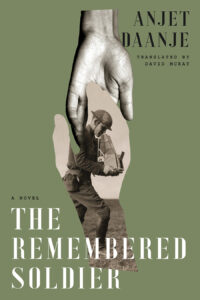
Anjet Daanje, author of The Remembered Soldier
What time of day do you work?
I try to do all the other things first (household chores, walking my dog, answering my mail, reading the paper etc.). When these chores are done I feel calm and focused, so then I sit down at my desk to write. Most of the days I write from the end of the morning till halfway through the afternoon. I write every day, in the weekends also. Sometimes, of course, I have too many other things I have to do, then I get too distracted to write, and I take the day off.
How do you tackle writer’s (or translator’s!) block?
There is no such thing as writer’s block. It is a myth made up by people who want to have you believe that writing is a mysterious occupation. You just have to get on with it, don’t whine, don’t panic. Do not tell yourself you’ve got writer’s block, it’s bullshit. Just sit down and start to write. Sometimes the writing is no good, but there’s always one good sentence, or one inspiring thought. Throw away the bad parts, and go on writing, using the good parts.
What’s the best or worst writing advice you’ve ever received?
I have written novels for more than 35 years now. During the first thirty years my books did not sell, only in the last five years my novels have suddenly become bestsellers. Early on in my career several people advised me to write simpler novels, or thrillers, so my books would sell. I never followed their advice. I did not understand why I should write novels I did not want to write, just to sell more books. I write to tell what I want to tell, or because I feel I must tell it, and because writing a novel is great. Everything is possible, you only have to think of it, and write it down.
Which non-literary piece of culture—film, tv show, painting, song—could you not imagine your life without?
I always listen to classical music when I write. It puts me in the right mood to write, without it writing is much harder. I love Bach, but I use his music cautiously. I tend to write emotional and solemn scenes when I listen to Bach, and you shouldn’t have too many of those in one novel.
What was the first book you fell in love with (and why)?
It was Jane Eyre by Charlotte Brontë. I was 16 when I read it, I had loved books before, but not like I loved Jane Eyre. After I read it, I read all the books by the Brontës, and also some books on Charlotte Brontë. Now, looking back, I know why I loved it so much. It is a very honest, emotional novel, reading it you live inside the mind of Jane Eyre. It feels like Charlotte Brontë wrote the novel in one long session, spilling her emotions on paper, without thinking about what she was doing. There are unbelievable plot twists in the novel, old fashioned digressions, and even things that don’t add up, but they all get swiped away by the tremendous psychological, emotional force of the book.

David McKay, translator of The Remembered Soldier
What time of day do you work (and why)?
As I get older, I become more aware of being at my best in the morning and having a mental dip in the mid-afternoon, from which I make a partial recovery one or two hours later. So I try to get the most challenging work done as early as possible and find other things to do around 3 p.m., like vacuuming, routine e-mail, or napping. Then I can return to the hard stuff for an hour or so before it’s time to make dinner.
Unlike many freelance translators I know, I’ve embraced the rhythms of office life and never made a habit of working in the evenings or on weekends. As Ursula K. Le Guin once wrote, “After 8:00 p.m.—I tend to be very stupid and we won’t talk about this.”
How do you tackle writer’s (or translator’s!) block?
When the flow is obstructed, I do something else for a while. Either some unconscious mental process is still unfolding, or else I’m tired and need a break. Incidentally, translator’s block is a much less common phenomenon than writer’s block, maybe because the translator never has to face a blank page. The writer’s words always offer places to begin.
Even when I have no problem getting words down on paper, there are times when something feels off and I question the quality of my work. But later, when I take a fresh look, I can’t usually see a difference between the passages that seemed dubious and the ones that felt inspired.
Which book(s) do you reread?
I reread many books, especially books I loved as a child. Sometimes I notice my perspective on them shifting; for many years after my initial encounter with it around the age of eleven, I remained in awe of Michael Ende’s The Neverending Story, but these days I’m more struck by what an insightful, prescient work his novel Momo is. The time thieves are everywhere these days, hiding out in our pockets and on our bedside tables.
Once in a while, I also enjoy revisiting a book that I used to read again and again as a child, but this time in a foreign language. I’ve improved my French with the excellent translation of the Earthsea trilogy (no coincidence that Le Guin is coming up again), and I adore the Frisian-language audiobook of The Hobbit, translated and read by the marvelous Frisian scholar and translator Anne Tjerk Popkema, who taught me most of the little I know about Frisian.
How do you decide what to read next?
I have oodles of books around the house, read and unread, and I scan my shelves and stacks until I find one that grabs me. I used to assign myself lists of books to be read in order, but that’s a grim business and by now I’ve mostly learned better.
If you weren’t a translator, what would you do instead?
Translation is, in large part, the art of listening and empathy. What I’ve learned about open-minded listening has been of great benefit to me as a translator, and I feel confident that what I’ve learned as a reader and a translator gives me greater insight into other people and makes me a better listener. Like many translators I know, I often do better one to one than in groups, and I enjoy conversations most when they don’t skim the surface but delve deep. That’s part of what I’ve loved about mentoring emerging translators. So I would probably do well in a profession such as counseling, interviewing, or consultancy, where listening and empathy are central.
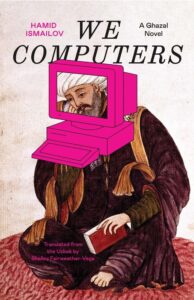
Hamid Ismailov, author of We Computers: A Ghazal Novel
What time of day do you work (and why)?
Unlike in my youth, when I began writing early in the spring as nature was returning to its strength, I now write between the clock changes—from the fall adjustment until the spring one—when the evenings are long. After finishing my daily work, I come home, rest for a while, and then sit down for two or three hours to write, refusing any socializing, television, or entertainment. I devote myself to writing every day.
How do you tackle writer’s block?
I recently gave a lecture at Oxford University about my unfinished work. While preparing for the lecture, I revisited many of my early projects—those I started but never finished, always moving on to something new. During this research, I discovered a wonderful logic behind why I had left them incomplete. Based on these findings, I wrote a novel titled Mother, Daughter, and Sinful Soul, in which readers can see how I cope with creative blocks, why they appear in the first place, and how I deal with them. In essence, I turned those unfinished works into a novel.
What’s the best or worst writing advice you’ve ever received?
I didn’t receive this advice directly. I actually borrowed the idea from the Uzbek writer Murad Muhammad Dost. He used to type his novels on long sheets of paper and, once finished, hang them on the wall to view the entire flow of the work—where it felt light, where it was too dense, and where it didn’t quite work. I do the same. When I finish a novel, I print it out on long sheets of paper and hang the whole text on the wall so I can see it as one large tableau or picture—where it succeeds, where it fails, and how it breathes as a whole. That’s when I begin my compositional editing.
Who is the person, or what is the place or practice that had the most significant impact on your literary education?
When I lived in Uzbekistan in my youth, the director of the Institute of Manuscripts, Professor Aziz Kayumov, became my mentor. Under his guidance, I worked on translating classical Uzbek and Persian literature—preserved in his institute—into Russian. It was like an academy for me; he guided me through every subtlety of classical poetry. Through this work, I learned the craft of the medieval masters. He is the person I ultimately regard as my teacher.
What part of your writing routine do you think would surprise your readers?
Perhaps what stands out most is the number of edits I make. I usually write my novels by hand. Then I use voice-to-text technology: I read the text aloud to the computer, listening carefully to its musicality and tonality, improving the flow as I go. Once it’s on the computer, I re-read and edit it again. Finally, I use text-to-speech to listen to the work once more, catching awkward phrases or passages that don’t sound right. Altogether, it takes at least four or five rounds of editing to turn the raw material into a finished work.
What was the first book you fell in love with (and why)?
My mother died when I was twelve years old, and I was left in the care of my grandmother, who was quite ill. She loved One Thousand and One Nights and often made me read it to her—a task I hated at the time, since my peers were out playing football, enjoying games, and wandering around, while I was forced to read those endless tales to my ailing granny. But now, when I look back on those moments and those stories, I love that book. It brings back all the imagination of the world—the wonder of fairy tales. It’s nostalgic, sweet, and bittersweet. It fills me with so many emotions that I feel it was my very first love affair with books.

Shelly Fairweather-Vega, translator of We Computers: A Ghazal Novel
Who do you most wish would read this book? (your boss, your childhood bully, etc.)
I’d like to require everyone who’s ever remarked that ghazals cannot be translated into English to read this book and reconsider their stance. Even the translator Dick Davis said this, quite famously, but I don’t think he really meant it.
What’s the best or worst writing advice you’ve ever received?
The best translation advice I’ve seen comes from a quote attributed to the very prolific translator of Italian William Weaver, which I found in the email signature line of my friend Tim Gregory, a translator of Arabic: “The worst mistake a translator can commit is to reassure himself by saying, ‘that’s what it says in the original,’ and renouncing the struggle to do his best.” We translators can’t settle for simply reporting what an author says in the original; we need to understand that utterance well enough, and be daring enough, to commit to an interpretation for our own readers.
What was the first book you fell in love with (and why)?
The Westing Game by Ellen Raskin, because it was so funny and clever, and I felt very funny and clever for reading and appreciating it.
How do you decide what to read next?
I read a lot of books translated by people I know, and a lot of books people want me to translate. One day I’ll read purely for fun again, but right now, I mostly read for deadlines.
If you weren’t a translator, what would you do instead?
I would probably be a diplomat or working in international aid or development, all careers I considered earlier in life. My country doesn’t seem to believe in those particular fields of endeavor at the moment, but fortunately, literary translation is still alive and kicking here.
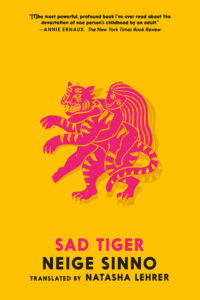
Neige Sinno, author of Sad Tiger
What’s the best or worst writing advice you’ve ever received?
Write about what you know (and I am not going to say if that was good or bad, you decide).
Who is the person, or what is the place or practice that had the most significant impact on your literary education?
Participating in a weekly writing workshop with local writers in Pátzcuaro, Michoacán, Mexico.
How do you decide what to read next?
I follow everybody’s advice, from friends to professors to strangers I meet in a bar, and even from literary magazines.
What’s one book you wish you had read when you were young?
Sad Tiger, I suppose.
If you weren’t a writer or a translator, what would you do instead?
In an ideal world I’d be P.J. Harvey. In real life I can be a decent housewife, I am also quite good at making dishes with eggplants and tomato sauce.

Natasha Lehrer, translator of Sad Tiger
Who do you most wish would read this book? (your boss, your childhood bully, etc.)
My high school French teacher. When I got an A in my French A level, when I was 18, she literally shouted from the other end of the corridor that when she saw the result she knew there was no god. I do wish she knew what I ended up doing with my life.
What time of day do you work (and why)?
I work best late at night, after the rest of the household has gone to bed. But it isn’t very conducive to falling asleep when I do finally get to bed.
Who is the person, or what is the place or practice that had the most significant impact on your literary education?
I had a few really remarkable English teachers at school and university, but my mother is the person who really formed me as a reader. She reads like other people breathe or eat – compulsively, constantly. When I go to visit she might be reading John Donne, or the bible, or SY Agnon, or all three. She is the most truly literary person I know. We spent more time at the local library when I was a child than we did doing anything else. She forgot to make sure I learned to swim, which I had to rectify years later, but I can’t fault her for my literary education.
What part of your writing routine do you think would surprise your readers?
I usually don’t read a book before I begin translating it. This tends to surprise people but I’ve actually met quite a few translators who do the same.
What is your favorite way to procrastinate when you are meant to be working?
Cooking (decently well) and playing the piano (fairly badly).
*
Young People’s Literature
Kyle Lukoff, author of A World Worth Saving
What’s the best or worst writing advice you’ve ever received?
An editor at a major publisher read an early draft of my picture book When Aidan Became A Brother, and told me that while she admired my passion, the writing just wasn’t there. She suggested that I “team up with a talented writer.” I did not take that advice.
Who is the person, or what is the place or practice that had the most significant impact on your literary education?
I don’t know if I could have become the writer I am without spending eight years as an elementary school librarian. Not only did it give me hundreds of mentor texts to draw from, my young patrons also taught me so much about myself, and what it means to be a person sharing the world with other people.
What is your favorite way to procrastinate when you are meant to be working?
One of my most annoying traits is that I never procrastinate. I once finished a book a whole year ahead of the deadline. When I turn a draft in on time I feel like it’s late. I’m not telling you this to brag, but rather to own up to the profound anxiety that undergirds the compulsion to get a thing done as quickly as possible just in case I can’t do it later due to unforeseen circumstances.
How do you decide what to read next?
Very chaotically. I’ll scroll on the internet, or go in a bookstore, and find a title that looks interesting. Then I open up the draft email where I keep the list, and add it to the very end. It’s a very, very long list, where the titles are uncapitalized, separated only by commas, and sometimes it’s the title + the author’s last name in case the title might be hard to find. Then I go onto the websites of the three libraries I have cards to and see where I can get it, preferably a physical copy at my local library but I download a lot of e-books especially before traveling. It’s not organized at all, which makes it fun—why did I write down this random title from three years ago? Let’s find out!
If you weren’t a writer, what would you do instead?
I spend a normal amount of time daydreaming about what I would do if I won the lottery and never had to worry about money again. And in all of my fantasies I find myself thinking, “I’d love to write a novel.” A sharp reader may have picked up on the fact that I have in fact written several novels, which does not mean that I have won the lottery but does mean that I’m very lucky. Despite my imagination (personally satisfying and professionally successful) I cannot imagine what I would be if I wasn’t also a writer.
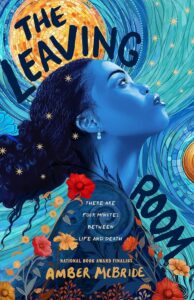
Amber McBride, author of The Leaving Room
What time of day do you work (and why)?
I am an insomniac so it’s usually around in the 9pm-3am timeframe. There is something about writing when everyone is asleep that feels a bit whimsical, dare I say magical.
What’s the best or worst writing advice you’ve ever received?
Best advice, read more than you write. Worst advice, don’t write for young adults—utterly horrible advice!
Who is the person, or what is the place or practice that had the most significant impact on your literary education?
Dr. Joanne Gabbin! She was my professor for a “Life Writing” class in undergrad and her kindness got me through a very hard time in my life. Dr. Gabbin is also the founder and former director of The Furious Flower Poetry Center which is one of the only Black poetry centers in the United States. After I got my M.F.A., Dr. Gabbin hired me at Furious Flower and introduced me to so many brilliant writers! She’s still a huge part of my life and I am so grateful for her!
Which non-literary piece of culture—film, tv show, painting, song—could you not imagine your life without?
Nina Simone’s voice. I can’t imagine a world without it. The first time I heard it I was a kid and I cried.
What do you always want to talk about in interviews but never get to?
I want to talk more about how there should be more novels in verse for adults. I wish we took time to examine how to make reading more accessible for adults who never saw themselves as vivacious readers. There are so many roadblocks when it comes to reading more; lack of time, working on strengthening attention span or feeling intimidated by the length of a novel. The rise in popularity of audiobooks helped to bridge some of these gaps but I think novels in verse can contribute in important ways too. I get asked about novels in verse for adults often, but I only have a handful that I can recommend. I think the brevity and depth of verse is for everyone.

Daniel Nayeri, author of The Teacher of Nomad Land: A World War II Story
Who do you most wish would read this book? (your boss, your childhood bully, etc.)
More than anything, I would love for people to be able to read my work in different languages, especially Farsi. It was my first language, of course, and the only one in which my father or grandmother could read my books. My first job in publishing was in the Foreign Rights department of a Literary Agency, so I count my wins in foreign editions of my work. And I love collaborating with translators, whose art form is supremely underappreciated.
Which non-literary piece of culture—film, tv show, painting, song—could you not imagine your life without?
I love watching really well-written TV (lots to choose from these days) with the script open in a window to follow along. Something about the way the actors/directors have altered the text in subtle and not-so-subtle ways that makes the viewing multi-layered and fascinating.
What was the first book you fell in love with (and why)?
The Hobbit was the first book I ever loved. It was the farthest possible world from the one I inhabited at the time, and it made me love everything from backpacking to outdoor cooking to tea time. It might have shaped the largest percentage of my passions and I haven’t even managed to build a perfectly round wooden door yet. Maybe someday….
What is your favorite way to procrastinate when you are meant to be working?
It’s easy to tell if I’m procrastinating from writing because I’ll go in the kitchen with some ludicrous image from the arms race known as Instagram Desserts and I’ll try my hand at recreating it. An apple pie baked into a cheesecake lined with brownie? You got it. Little tarts designed with geometric patterns? Gourmet Pop-Tarts? Suddenly, five hours are gone and I haven’t written a word.
How do you decide what to read next?
Every room in my house has a book I’m currently reading. By my desk, the serious research history books. By the bed, pulp fantasy from the 1950s. Manga/Comics sit on a chair in the corner. Beside the couch, a wicker basket full of library books. I guess the short answer is that I don’t choose. I just read everything that looks interesting.
If you weren’t a writer, what would you do instead?
I’d wander.

Hannah V. Sawyerr, author of Truth Is
Who do you most wish would read this book? (your boss, your childhood bully, etc.)
I hope Truth Is lands in the hands of teenagers who feel their choices do not belong to them. I want the novel to reach teenagers with below average grades who are convinced they do not have a future. I hope the book finds teenagers who are navigating real-life issues people often consider “too adult” for their age. I want Truth Is to offer young people hope, even if Truth’s specific journey cannot provide all the answers.
Ultimately, I want young people who read Truth Is to know they are allowed to dream big and be big.
Who is the person, or what is the place or practice that had the most significant impact on your literary education?
There are many, but I’d like to give thanks to the first. My high school English teacher, Ms. Tanis, was the first teacher to make me feel like I was intelligent and capable. I remember being angry with her when she pulled me aside and asked why my efforts weren’t matching my potential because she was the first teacher to see through me in that way. I’m thankful for the care, honesty, and grace she shared with me and many of the other marginalized students at my alma mater.
I also want to give thanks to DewMore Baltimore, the youth serving art & activism organization that I joined when I moved to Baltimore back in 2014. They taught me that I have a voice and how to use it, even when I am afraid.
What part of your writing routine do you think would surprise your readers?
I read my work out loud several times and often consider sound when I am revising. I have a background in spoken word poetry, so I often cannot connect with the work if the words do not feel good leaving my body.
What was the first book you fell in love with (and why)?
Speak by Laurie Halse Anderson when I was a high school student. I both rooted for and learned from the main character Melinda, a survivor of sexual abuse. That novel offered me understanding and gave me courage.
Which book(s) do you reread?
There are many since I love rereading and have many comfort books. A few frequent rereads for me include Monday’s Not Coming by Tiffany D. Jackson, The House on Mango Street by Sandra Cisneros. and The Complete Poetry of Maya Angelou by Maya Angelou herself.
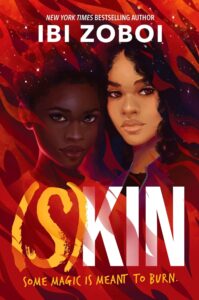
Ibi Zoboi, author of (S)Kin
Who do you most wish would read this book? (your boss, your childhood bully, etc.)
I want anyone who has been told that their culture is scary or evil to read (S)kin. If you were raised to believe that your folklore and mythology are disposable or silly superstitions, then I hope (S)kin will allow you to see how powerful our stories can be, whether or not we believe they are real.
What time of day do you work (and why)?
I work at all times of the day. It’s pretty chaotic. But my best writing comes in the early mornings, just after dawn. My mind is clear and it’s quiet.
Who is the person, or what is the place or practice that had the most significant impact on your literary education?
Two writers have had a huge impact on me. Edwidge Danticat showed me that no matter how Haiti is portrayed on the news, readers will still want to know the truth through our stories. Octavia Butler taught me the power of imagination, that no matter how strange an idea may seem, good writing can make the impossible possible.
What’s one book you wish you had read when you were young?
I can’t pick just one! I wish I read The Poet X by Elizabeth Acevedo when I was exactly 16. It would’ve made me a poet and an avid reader much sooner. Then I would’ve loved to have had Every Body Looking by Candice Iloh at 17 or 18, right before heading to college. Also Piecing Me Together by Renée Watson would’ve been such a balm.
If you weren’t a writer, what would you do instead?
If I weren’t a writer, I would be a documentary filmmaker. Or a dancer/choreographer. Either way, I’d be a storyteller. My medium would just be different.
Emily Temple
Emily Temple is the managing editor at Lit Hub. Her first novel, The Lightness, was published by William Morrow/HarperCollins in June 2020. You can buy it here.









